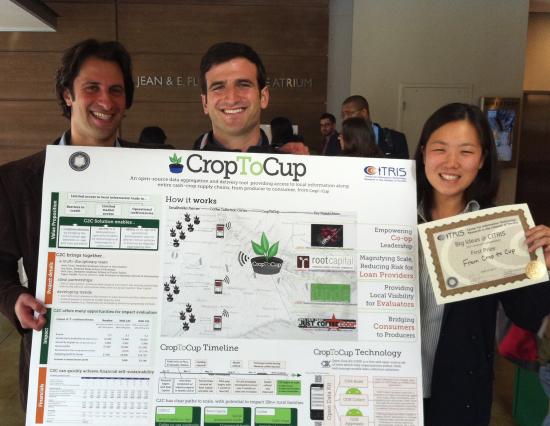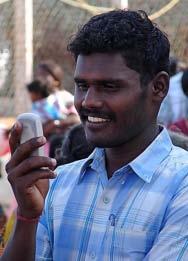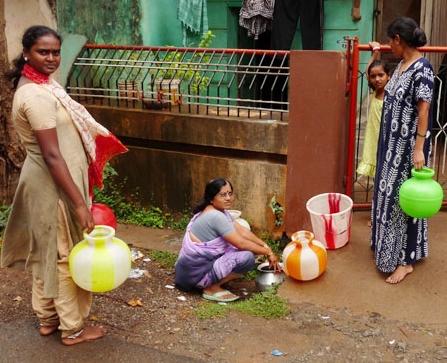Three School of Information student teams have received awards this week for projects that help the developing world using information technology.
At yesterday's CITRIS Big Ideas competition, the $15,000 first-place prize went to the project From Crop to Cup, including I School master's student Ariel Chait along with teammates Iris Shim (business) and Seth Garz (public policy).
From Crop to Cup assists rural smallholder farmers with mobile information-management tools to help them gain access to credit, specialty markets, and fair trade or organic certification. Initially, the project is focusing on coffee growers in Latin America; the team is developing partnerships with Root Capital, a nonprofit social investment fund financing grassroots businesses in developing countries, and CEPCO, a coffee cooperative in Oaxaca, Mexico.
Fair trade and organic certification can open lucrative markets for the growers, but the certification process requires detailed information and documentation; "From Crop to Cup" is developing easy-to-use mobile apps for grower cooperatives to collect and manage the data necessary for certification. Improved data and documentation can also help cooperatives obtain affordable credit, by lowering the bank's due-diligence costs and helping the bank manage risk; access to credit is crucial for the growers' economic viability, allowing them to invest in their farms and improve their yield and efficiency. The same information can open the door to market to specialty roasters, who want to be able to demonstrate to their customers who they're buying from and how much they're paying.
The project MobileWorks shared third prize in the Big Ideas competition; the team includes I School students Prayag Narula, David Rolnitzky, & Philipp Gutheim, along with industrial engineering student Anand Kulkarni.
MobileWorks aims to open up India’s burgeoning outsourcing industry to impoverished groups who are currently being left behind. The project takes advantage of India’s widespread mobile phone usage to send outsourced data-entry jobs to the mobile phones of India’s villagers and slum residents, providing them fair trade wages. MobileWorks is an outsourcing solution that is more cost efficient, scalable, and accurate than existing solutions; it also provides an employment opportunity for the underemployed to earn a supplemental income. The MobileWorks team has already deployed a working prototype for in-field testing, and the preliminary responses are encouraging.
One of the the second-place co-winners also has an I School connection; the project Shreddr (like MobileWorks) originated in the School of Information's "Social Enterprise using ICTs for International Development" course last fall, which trained students to create social enterprises for rural developing regions, using information and communication technologies.
Another I School project, NextDrop, won the $25,000 grand prize in last week's Global Social Venture Competition competing with fourteen other projects from around the world.
NextDrop addresses the challenge of unreliable piped water in developing countries by providing households with reliable, near real-time information about water arrival via the mobile phone infrastructure. The NextDrop team includes I School master's student Thejo Kote along with teammates Anu Sridharan and Emily Kumpel (civil engineering), Ari Olmos (public policy master), and Ashish Jhina (business).
The Global Social Venture prize comes on the heels of a string of high-profile awards for the NextDrop project. They have also been awarded the Global Social Entrepreneurship Competition's information & communication technology prize, the Clinton Global Initiative University award for outstanding commitment, the 2010 CITRIS "Big Ideas" award, and the GSMA mWomen BOP App Challenge award.













